In the story Dune, Arrakis is the most dangerous planet in the universe. It’s a vast desert world where the scorching sun’s intense heat is a major hazard. Water is nearly impossible to find, and dehydration will claim an unprotected person in a matter of hours. More frightening, though, are the sandworms--enormous, carnivorous creatures that move beneath the ground and hunt by detecting vibrations. The sandworms hear you when you walk in the open deserts of Arrakis, and they always come.
To capture the danger of Arrakis in Dune: Awakening, Funcom riffed on its earlier success with survival title Conan Exiles. Awakening is also a survival game, but the story of Dune is as much about the deadliness of Arrakis as it is about the potentially lethal scheming of the political powers who wish to control it.
During a recent hands-off preview event for Dune: Awakening, creative director Joel Bylos explained how Funcom is merging survival game elements, which will make staying alive on Arrakis your top priority, with more traditional MMO elements like social interactions with other players on big servers, as well as placing a big emphasis on player-vs.-player gameplay. However, making the disparate elements of survival games and MMO games work together hasn't been easy, he said.
"It's been horrible, really," Bylos joked in an interview with GameSpot. "It's a difficult thing. I think MMOs have nailed approachability: A player starts an MMO and it's like, you're killing the same monsters for 10 minutes and you've got a new ability now. I don't think our game feels like that. It's quite demanding of the player in the beginning. It's definitely survival."
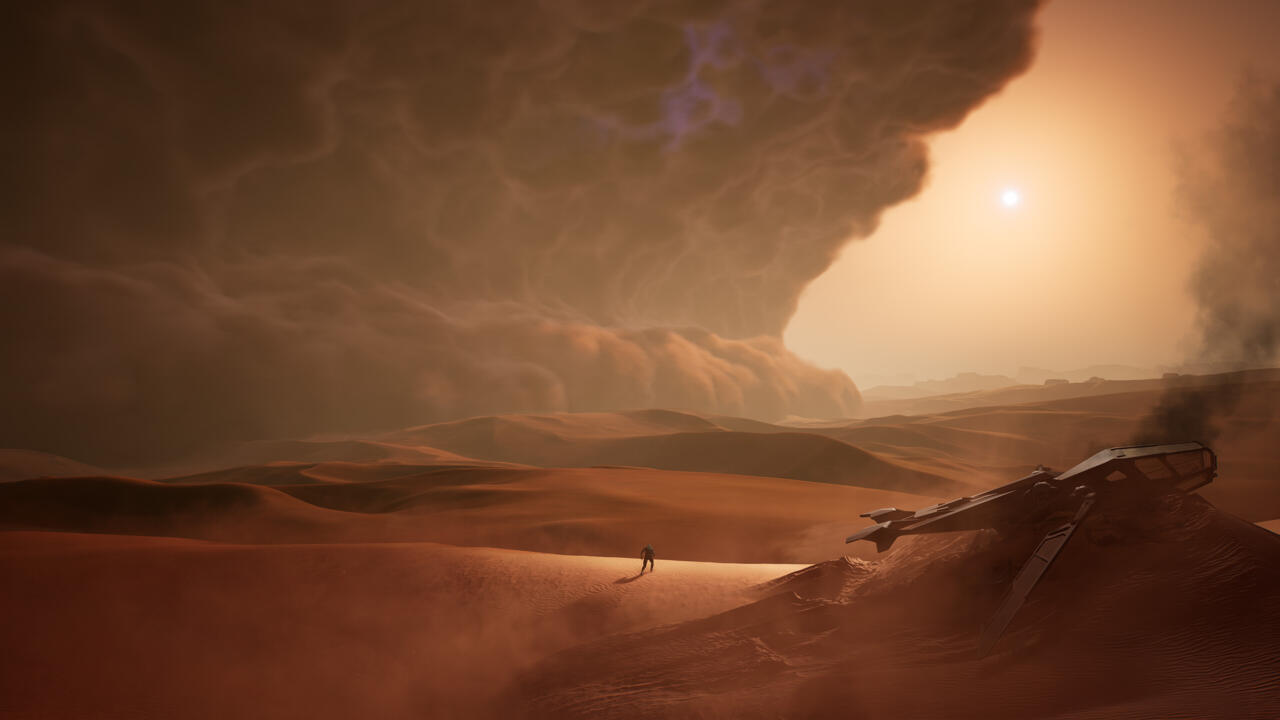
From Bylos's description, Dune: Awakening starts you on Arrakis as a castaway. Stuck in the desert with no provisions, you immediately have to worry about Awakening's three main elements of survival: finding water, securing shelter, and avoiding sandworms. The threat of the burning sun means you'll need to move quickly between patches of shade, and with no stillsuit--the Dune universe's apparatus for saving and recycling a person's water--you'll need to find water quickly to stay alive. Bylos said that you'll craft a makeshift knife early on and hinted that you might need to take someone else's water for yourself.
Survival elements are at the core of Dune: Awakening, so expect a progression through much of the game that's similar to other entries in that genre. You'll harvest rocks and minerals that you'll use in crafting, construct a base, and climb a tech tree to unlock new tools and weapons. But there's a story calling to you too. Bylos said that before long, your character will have a "spice dream"--a premonition like those experienced by people living on Arrakis, induced by the incredibly valuable substance that drives the conflict on the planet--that will drive you into Dune: Awakening's narrative.
An alternate-history Dune story
If you're a Dune fan, it sounds like that narrative will be an intriguing one. Dune: Awakening imagines an alternate history from the one fans know from author Frank Herbert's books or director Denis Villeneuve's recent movie adaptations from which Awakening is inspired. There's a key moment in the game's story where an event plays out differently than in the books and movies, resulting in a world where characters who died in the canonical story are still alive (although Funcom hasn't said exactly which key moment that is). Bylos also explained that character creation puts you into the iconic "pain box" scene from Dune, during which you'll make choices about your character's background while being interrogated by a Bene Gesserit reverend mother.
That's a cool way to use a great Dune moment as part of the gameplay experience, but in the book and movie, the Bene Gesserit use the pain box to identify whether protagonist Paul Atreides has the potential to be the Kwisatz Haderach, a powerful messiah-like figure. The pain box test isn't something given to very many people--so if everyone who goes through character creation is getting it, that has some pretty big implications about who the player characters are and what their impact on the world of Dune: Awakening might be.
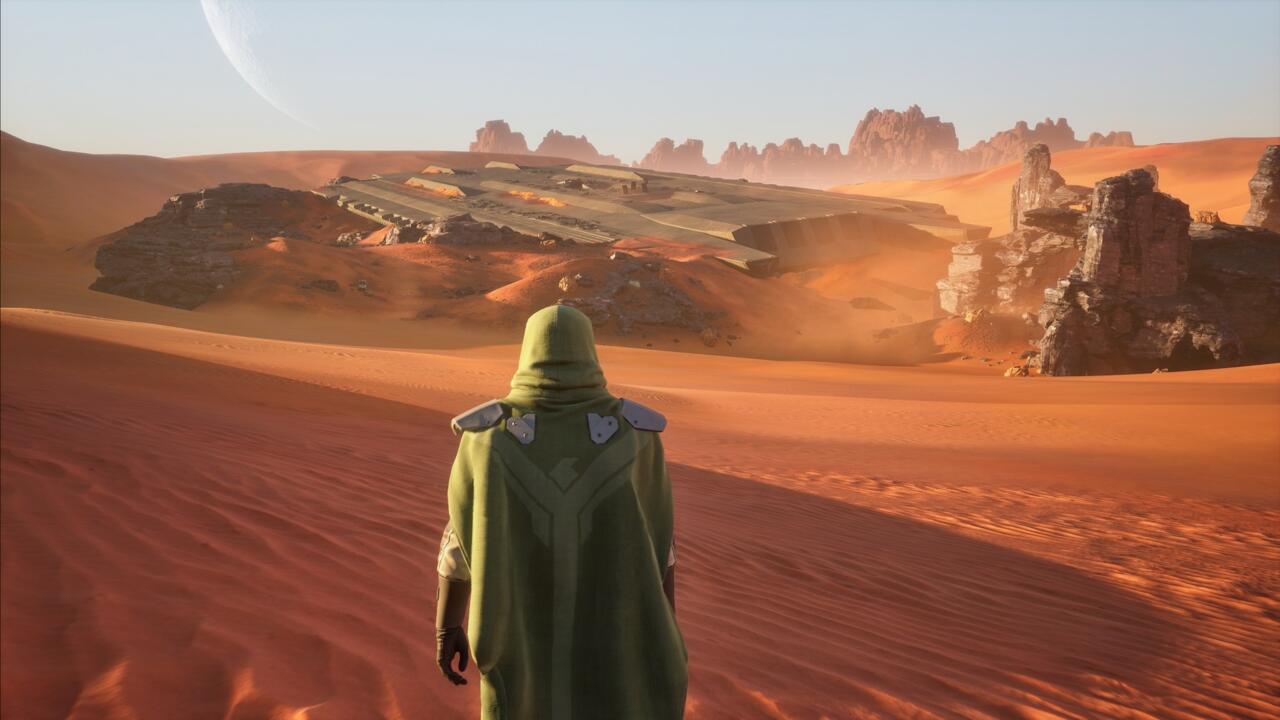
The concept goes back to the title of Dune: Awakening. Bylos said it's a direct reference to a line in the novel, in which Paul's father, Duke Leto Atreides, tells him about the importance of new experiences for a person to grow. "Without change, something sleeps inside us, and seldom awakens," he tells Paul. "The sleeper must awaken."
"That's a really nice encapsulation of both the journey of you as a player--you're experiencing new things and it's awakening you--but it's also very heavily tied to our storyline," Bylos explained.
Bylos wouldn't share many details about where its alternate story goes, but central to the plot is the ongoing war for control of Arrakis between the Atreides and the Harkonnens, the two rival noble houses in the movies and books. He said Dune: Awakening's thematic focus is on four narrative pillars: addiction, freedom, identity, and erosion.
"The concept from our end is that Arrakis erodes all of these things," he said. "So if you think about the Harkonnen and the Atreides, the Atreides are very noble. But Arrakis erodes that identity. So you put the Atreides on Arrakis, and are they still noble? What happens? How do they change? And the Harkonnen as well. They strongly love their addictions--their addiction to power, their addiction to spice. And when they're on Arrakis, it eats at that, it makes it worse. The smugglers consider themselves to be free, they're this free people, they're free and they live on Arrakis and they harvest spice and they sell it, but are they really free when they're still beholden to the Guild? So, there are these kind of thematic questions that I think the narrative asks and all of these apply to the players as well, like how the player journeys through the game, how the story is going to impact that as well."
An RPG-like approach to story is part of the Dune: Awakening experience, and you'll interact with various characters and factions through elements like dialogue options, Bylos said--but don't expect to be locked into a tightly structured, story-driven experience. Awakening is a sandbox game, so you'll have the ability to set your own agenda you want that comes with that approach. Even if you're working through narrative beats, you'll also need to continue to craft new items and advance through the survival and open-world elements to progress.
Venturing into the deep desert
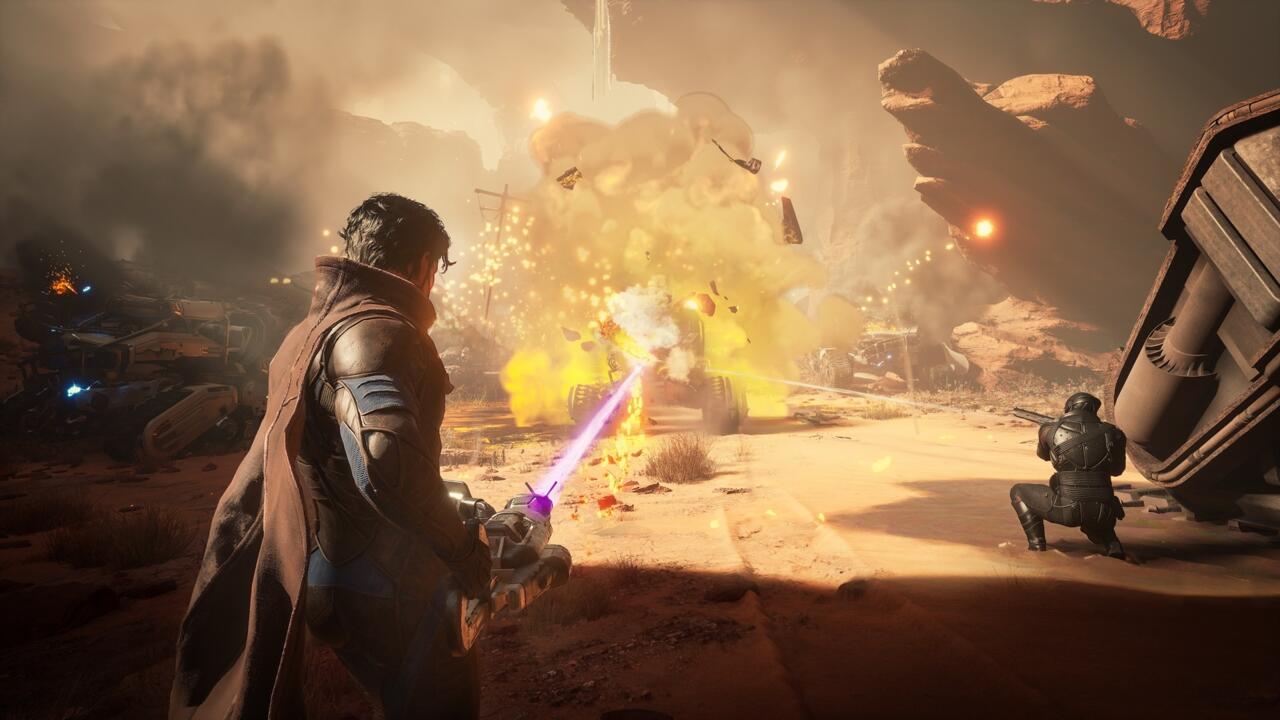
From the sound of things, that'll provide quite a bit of freedom, with Funcom working to make the late-game of Dune: Awakening an experience driven by players and their smaller conflicts as much as a wider story about the war on Arrakis. As you advance into the later parts of the game, you'll be able to form guilds with other players and pursue different approaches to existing on the planet, like crafting things to sell on the in-game auction house called the Exchange. Another approach might be to venture out into the deep desert, a player-vs.-player area where you can attempt to harvest spice or search for rare and valuable items or crafting schematics.
The deep desert will seemingly carry the best rewards and the biggest risks in Dune: Awakening. The PvP elements mean that other players can attack you and steal your stuff while you're harvesting spice or exploring ruins, but there's also the constant threat of sandworms, too, which are a unique danger in Dune: Awakening.
Death is an ever-present danger on Arrakis, but since Dune: Awakening is a video game, it's not as punishing or permanent as it is for the characters of the movies and novels. If you take too much damage in combat, Bylos said, a friend or teammate can revive you, or you can use water to revive yourself if you're carrying enough. If you're not revived, you can respawn at a point you've designated, like a vehicle or a base--pretty standard for both MMOs and survival games.
If a sandworm kills you, though, things are different. You won't die permanently, but you will permanently lose everything you were carrying. Bylos said the developers wanted players to feel the tension and danger the sandworms present, making them a threat you always need to be aware of and ready to escape.
The other major element of the deep desert is the Coriolis storm, a massive sandstorm that sweeps through the area once a week and totally rearranges the map. While you might find a shipwreck or a ruin in the deep desert one week, when the Coriolis storm comes through, that location will be buried and new ones will be exposed. Within those new structures might be rare or even unique items and schematics that you can claim and then use to craft items to sell on the Exchange that no one else has, providing a major incentive for players to find them before they're gone--and fight to claim them.
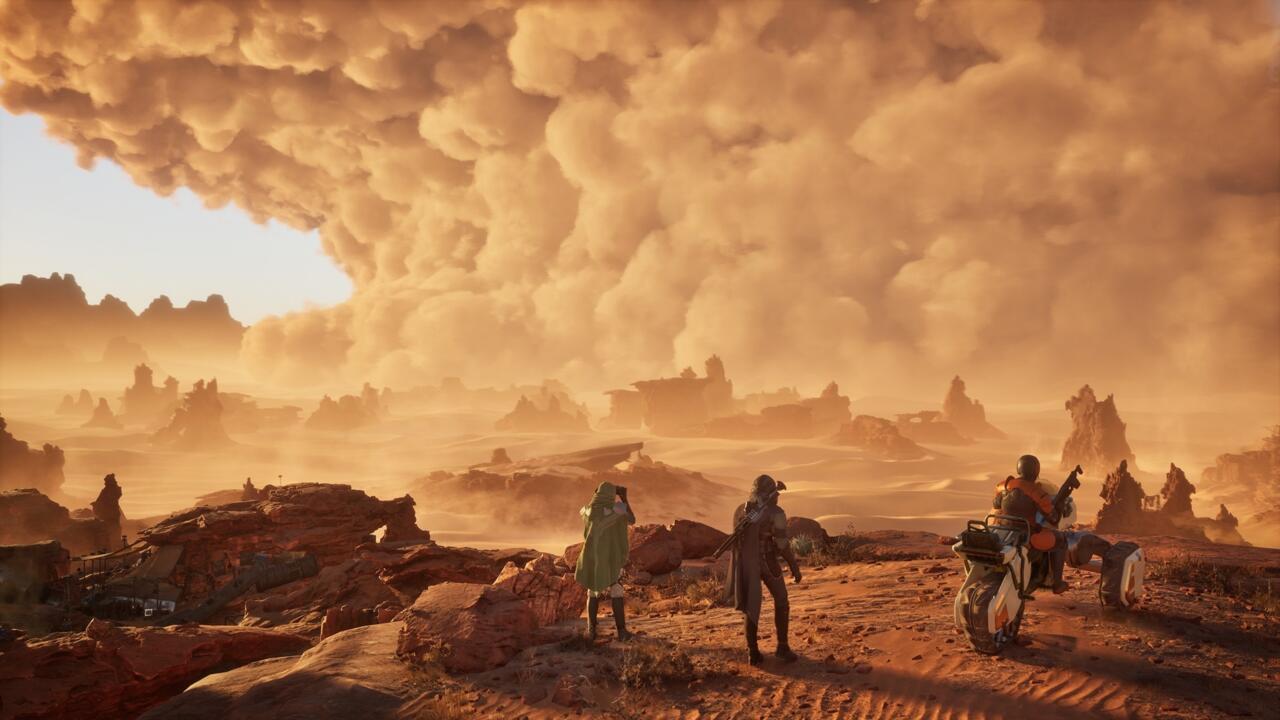
Bylos said that the Coriolis storm's rearranging of the deep desert is a bespoke design element controlled by the developers, not something random or procedurally generated.
"So actually, this was me trying to be a good game designer and looking at activity cycles, through the week, and looking at how people play online games, and when people are most active online and things like that," he explained. "So let's say this happens on a Tuesday night, then on Wednesday, Thursday, Friday, people have their scouts out. I want to create this condition, I call it the Coriolis race, where guilds are like, 'Send the scouts in,' and the scouts go out there and remap the landscape for us. And it gives those pilot players a real feeling that they matter. They can sell and craft those maps that they bring back. So they're able to print out their maps, give them to their friends."
Once player guilds know the lay of the land, they'll assess their goals in the deep desert. Dune: Awakening also includes a system that simulates the political struggles of the major factions on Arrakis, and that system will provide changing objectives and goals to players aligned with them that will inform what the guilds are trying to do after each Coriolis storm. Each week, different players will have different goals they're trying to achieve in a new, refreshed version of the deep desert.
"I think about player activity and how they play games, and I'm trying to build something that just feels like it makes sense to players and feels like we actually have created something that they get something out of every week," Bylos continued. "I expect the big battles to happen on Saturday and Sunday, right when most people are playing. So I think there's a bit of a logistics phase building up to that weekend, and then there's a bit of a down-ramp phase building into the next Coriolis cycle."
And because the changes created by the Coriolis storm are dictated by the developers, Funcom can create specific scenarios during a weekly refresh--potentially pushing smaller stories or encouraging player clashes in specific ways.
Surviving the intrigue
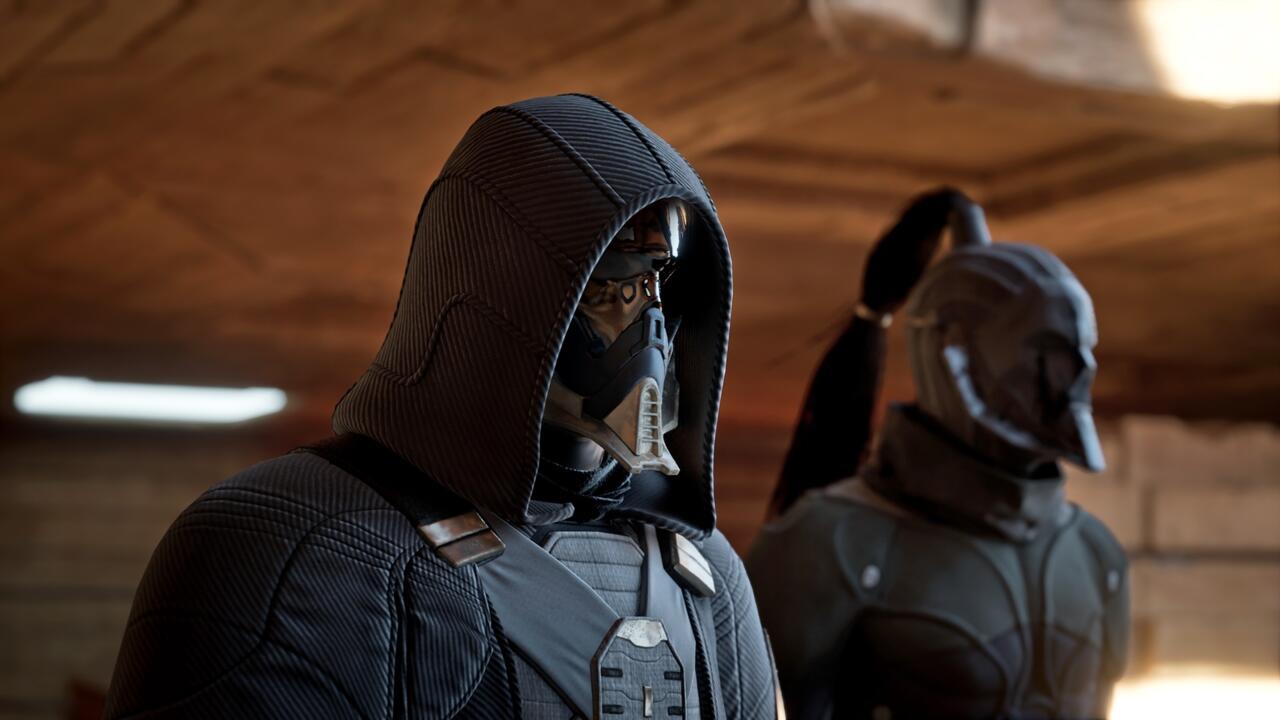
Details are thin about the political system in Dune: Awakening, but Bylos said that navigating the machinations of different factions is another element of survival Funcom is trying to infuse into the game. The intrigue is a major element of the Dune novels and movies, and it sounds like you'll be taking part in it as well.
Bylos didn't share specifics but did provide a "carrot" that might shed some light on how Funcom is thinking about the political element of the game. Bylos mentioned Bingo Brawlers, a competition created by streamer Captain Domo between Elden Ring players. The game sends two streamers out into the game world to complete tasks listed on a bingo card, with each working to accomplish five of those goals to make a line, just like in a bingo game. The twist is that both players are working on the same bingo card, but they don't know what square the other person is working on until it's completed. That adds an element of strategy and speed to the competition because one player might complete a square in the other player's line, blocking them like in Tic-Tac-Toe.
"Look at Bingo Brawlers and you can see at least partially some of my inspirations," he said. "I think they've done a really good job with that system of taking an essentially a purely PvE [player-vs.-environment] experience and turning it into a PvP [one], but not in the way that people are killing each other all the time, which I think is also super-interesting, because people are drawn to competition, but it kind of sucks to be shot and killed all the time."
Players will also have ways to contribute that aren't taking part in a big weekly gunfight, Bylos said. Some political objectives might mean crafting vehicles or other elements, for instance.
"Objectives like 'craft 500 ornithopters and deliver them to this location,' they don't need to be combat-driven. But you could, in a world where you could steal ornithopters, it's fine, right? So what I mean is, players will find a way--give them an arrow telling them what they need to do and then let them figure out in a sandbox how to do it. And I think that's what drives these kinds of games."
Dune: Awakening is slated to release on PC, Xbox Series X|S, and PlayStation 5, but currently has no set release date. You can sign up for the Dune: Awakening closed beta on its website.

